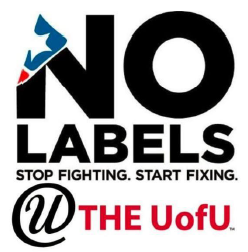U student group, No Labels, is part of a nonprofit national organization dedicated to ending political gridlock in Congress and furthering four goals to secure America’s future.
Their objective includes creating 25 million new jobs in the next 10 years, assuring Social Security and Medicare for 75 years, balancing the federal budget by 2030 and making America energy secure by 2024.
Austin Fulton, a junior in political science, started the U chapter because he was impressed by the agenda and wanted to create an open environment on campus for students to learn about political issues.

“We want to be a place where people can be involved politically that don’t want to join College Republicans and College Democrats,” Fulton said. “We don’t have anything against those [groups], but we want to have a place where we can have speakers come talk on the issues, we could hear a variety of different positions and be informed on the issues rather than have a party narrative.”
Currently there are over 70 members of Congress backing No Labels. Fulton said he realizes the organization’s aims are high, but their purpose is to put pressure on local senators and representatives so they become obtainable. He said if politicians do not want to agree, they would like to hear their alternative plans.
“It’s a lot easier to say you disagree with someone than bringing forward your own ideas. That’s what both parties are doing right now,” Fulton said.
Andy Cunningham, a senior in political science and the group’s vice president, said to think of No Labels as having the potential of the Tea Party to create change, but on a less partisan level.
“If you can start with a group of students on campus and you can eventually build more whether that’s faculty or people in your community, it’s a political movement that eventually more people could care about,” Cunningham said.
No Labels is unaffiliated, in order to expose students to as many solutions and ideas as possible and is open to all political backgrounds and knowledge.
“If you want to be involved in politics – if you want to actually learn – you don’t want to put yourself in an echo chamber; you’re hearing what you believe already,” Fulton said. “It’s being able to realize that there are solutions within both parties and we need to set aside our pride and figure them out.”
Beyond putting pressure on Utah’s congressional members to agree to these positions, No Labels wants to educate on hot-button issues, hold debates and help students figure out how they align politically.
The group receives funding from ASUU and there are currently 10 members. For more information, you can visit the group’s Facebook page, “No Labels at the University of Utah.”
k.ehmann@dailyutahchronicle.com
@EhmannKy

